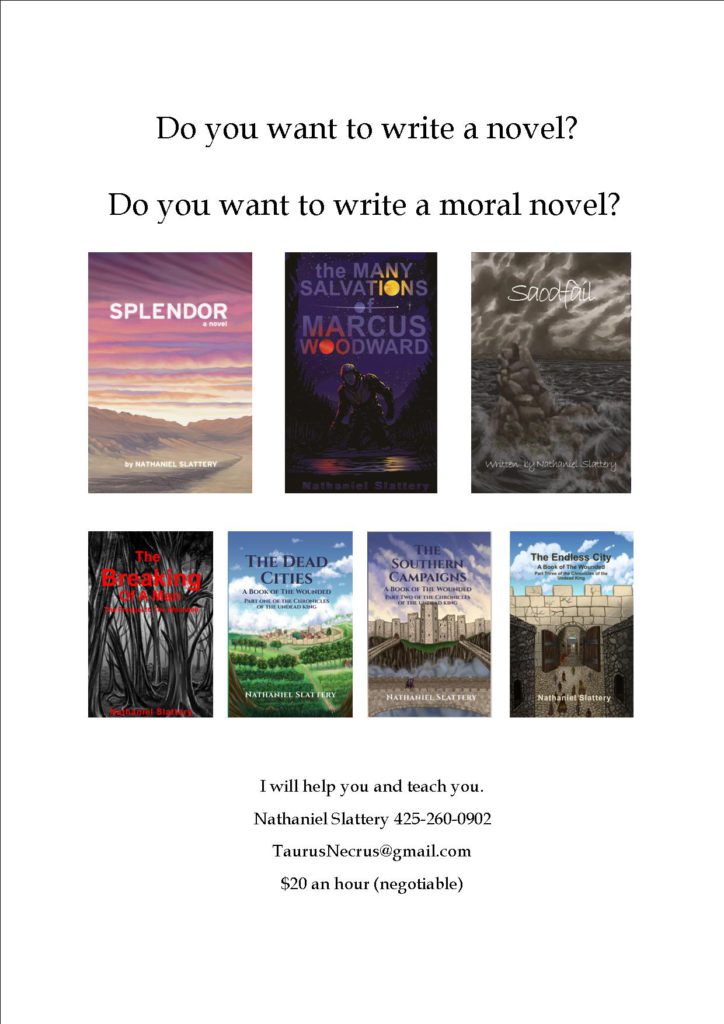5) Mechanics:
1) Dialogue

I have broken a large essay into segments to finish out this month.
Let us look today at six mechanics of composition. As before, I am going to do so in a sort of freeform style, since I am still in the process of developing this course. These six are: dialogue, description, names, numbers, time, and location. You will notice that these recall some of what I have talked about before, especially in the Ten Commandments and in beginning a story. These are not on the same level, however, but are smaller and more concise elements of writing which operate within the paragraph or sentence. Perhaps at a later time I can talk about all these levels and expound every element within them, but they are, briefly: Word, sentence, paragraph, scene, chapter, section, and book.
Dialogue
Let us begin with dialogue. When I first started writing, I was told that I had a natural talent at this, but I am now unsure. It is the conversation between persons contained within “quotations”. It is related to letters, documents, proper quotations, thoughts, conversational description, etcetera, but these only indicate and affect dialogue, without being a portion to it necessarily.
Here is a random example:
He got there, and Ehtan was sitting at the desk. “I know what you’re going to say.”
Will slammed his palms down on the wood. “Oh, really? What am I going to say?”
“You’re going to say you don’t want to follow this man.”
“That’s an excellent guess. So let’s dump him in the Wood and be done with it.”
Ethan gave him a dangerous look. “Do you think you’re in charge, Draegon? You’re still a wet-behind-the-ear first-year to me.” The man stood up with commanding anger. “I don’t care how many men and lions you’ve killed.”
Will crossed his arms. “I’ve killed a lot, Durgin.”
It is painful to transpose this because it is from my worst writing, the very one of which I received that flattery. But there are uses in examining it. First of all, as can be seen from the conjunctions and slang-jargon, it is written in modern parlance, without accent, despite the classical setting and the fact that they are ostensibly speaking German.
With dialogue, as with all mechanics in writing, you should not see yourself as required to render something precisely according to reality. You are participating in a portrayal and simulacrum which is separated from plain reality. This carries many dangers. The benefit is that there is not a necessarily correct way to perform your function. You only ever approach to perfection, which exists in God’s perfect simplicity alone.
Therefore, you use the tools which you have according to what you are trying to accomplish. If you have a hammer, you use it; if you have a nail gun, you use it; if you have both, you make a decision between them based upon prudential principles.
You do not have to render accent in the way some people do. It is not required. It might hurt as well as help you. Neither do you need to adjust your language. Personally, I recommend proper, common English without slang or conjunction to make things simple and to have a consistent rule. But in this example, I was portraying the degradation and corruption of the world, and that came out in the language.
The easiest way to write dialogue is to imagine yourself having the conversation. You have to have some regularly to do this. Every time an external factor affects what you say (for instance, you imagine the conversant standing up as he responds to you), then put that down. But otherwise, only give the words spoke, and do not worry if it seems repetitive in format. Also do not worry to use the word “said” often, despite whatever people tell you. In dialogue, it is what is contained with the quotation marks that principally matters, and all else is a distraction. If these distractions are allowed, they should be important. Do not vary your verbs or your references (William, Mr. Turnpike, the man, the messenger, all referring to the same person) arbitrarily as if to spice it up. It is distracting and pointless. These words ought to be read past and ignored so that the dialogue itself stands out. In editing, you will find the necessary flags that are required to make it clear who is speaking at what time. It usually is not great the first time, because these things occur to the reader so much faster than to the writer, and confusions come from small words (for example, “he said” versus “James said”). I reiterate: In dialogue, the words outside the quotations are skipped over and often should be, so it is actually better to repeat them rather than vary them, despite whatever useless things they might teach you in public school.
Next comes description. (Then name, number, time, and location)

